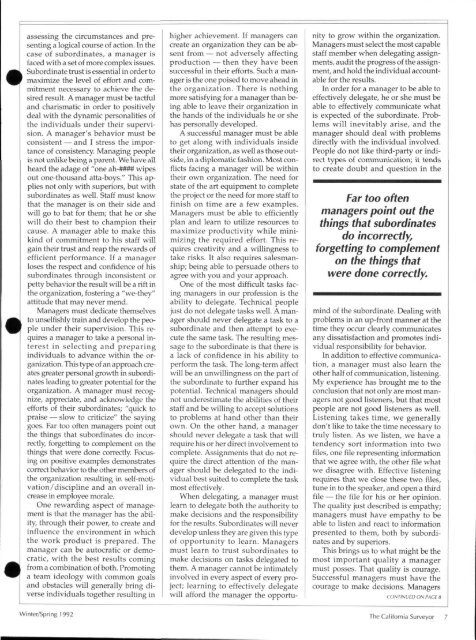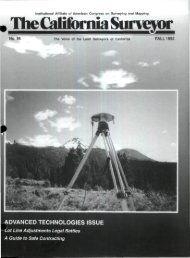Create successful ePaper yourself
Turn your PDF publications into a flip-book with our unique Google optimized e-Paper software.
•<br />
•<br />
^ ^<br />
^^<br />
assessing the circumstances and presenting<br />
a logical course of action. In the<br />
case of subordinates, a manager is<br />
faced with a set of more complex issues.<br />
Subordinate trust is essential in order to<br />
maximize the level of ef<strong>for</strong>t and commitment<br />
necessary to achieve the desired<br />
result. A manager must be tactful<br />
and charismatic in order to positively<br />
deal with the dynamic personalities of<br />
the individuals under their supervision.<br />
A manager's behavior must be<br />
consistent — and I stress the importance<br />
of consistency. Managing people<br />
is not unlike being a parent. We have all<br />
heard the adage of "one ah-#### wipes<br />
out one-thousand atta-boys." This applies<br />
not only with superiors, but with<br />
subordinates as well. Staff must know<br />
that the manager is on their side and<br />
will go to bat <strong>for</strong> them; that he or she<br />
will do their best to champion their<br />
cause. A manager able to make this<br />
kind of commitment to his staff will<br />
gain their trust and reap the rewards of<br />
efficient per<strong>for</strong>mance. If a manager<br />
loses the respect and confidence of his<br />
subordinates through inconsistent or<br />
petty behavior the result will be a rift in<br />
the organization, fostering a "we-they"<br />
attitude that may never mend.<br />
Managers must dedicate themselves<br />
to unselfishly train and develop the people<br />
under their supervision. This requires<br />
a manager to take a personal interest<br />
in selecting and preparing<br />
individuals to advance within the organization.<br />
This type of an approach creates<br />
greater personal growth in subordinates<br />
leading to greater potential <strong>for</strong> the<br />
organization. A manager must recognize,<br />
appreciate, and acknowledge the<br />
ef<strong>for</strong>ts of their subordinates; "quick to<br />
praise — slow to criticize" the saying<br />
goes. Far too often managers point out<br />
the things that subordinates do incorrectly,<br />
<strong>for</strong>getting to complement on the<br />
things that were done correctly. Focusing<br />
on positive examples demonstrates<br />
correct behavior to the other members of<br />
the organization resulting in self-motivation/discipline<br />
and an overall increase<br />
in employee morale.<br />
One rewarding aspect of management<br />
is that the manager has the ability,<br />
through their power, to create and<br />
influence the environment in which<br />
the work product is prepared. <strong>The</strong><br />
manager can be autocratic or democratic,<br />
with the best results coming<br />
from a combination of both. Promoting<br />
a team ideology with common goals<br />
and obstacles will generally bring diverse<br />
individuals together resulting in<br />
higher achievement. If managers can<br />
create an organization they can be absent<br />
from — not adversely affecting<br />
production — then they have been<br />
successful in their ef<strong>for</strong>ts. Such a manager<br />
is the one poised to move ahead in<br />
the organization. <strong>The</strong>re is nothing<br />
more satisfying <strong>for</strong> a manager than being<br />
able to leave their organization in<br />
the hands of the individuals he or she<br />
has personally developed.<br />
A successful manager must be able<br />
to get along with individuals inside<br />
their organization, as well as those outside,<br />
in a diplomatic fashion. Most conflicts<br />
facing a manager will be within<br />
their own organization. <strong>The</strong> need <strong>for</strong><br />
state of the art equipment to complete<br />
the project or the need <strong>for</strong> more staff to<br />
finish on time are a few examples.<br />
Managers must be able to efficiently<br />
plan and learn to utilize resources to<br />
maximize productivity while minimizing<br />
the required ef<strong>for</strong>t. This requires<br />
creativity and a willingness to<br />
take risks. It also requires salesmanship;<br />
being able to persuade others to<br />
agree with you and your approach.<br />
One of the most difficult tasks facing<br />
managers in our profession is the<br />
ability to delegate. Technical people<br />
just do not delegate tasks well. A manager<br />
should never delegate a task to a<br />
subordinate and then attempt to execute<br />
the same task. <strong>The</strong> resulting message<br />
to the subordinate is that there is<br />
a lack of confidence in his ability to<br />
per<strong>for</strong>m the task. <strong>The</strong> long-term affect<br />
will be an unwillingness on the part of<br />
the subordinate to further expand his<br />
potential. Technical managers should<br />
not underestimate the abilities of their<br />
staff and be willing to accept solutions<br />
to problems at hand other than their<br />
own. On the other hand, a manager<br />
should never delegate a task that will<br />
require his or her direct involvement to<br />
complete. Assignments that do not require<br />
the direct attention of the manager<br />
should be delegated to the individual<br />
best suited to complete the task<br />
most effectively.<br />
When delegating, a manager must<br />
learn to delegate both the authority to<br />
make decisions and the responsibility<br />
<strong>for</strong> the results. Subordinates will never<br />
develop unless they are given this type<br />
of opportunity to learn. Managers<br />
must learn to trust subordinates to<br />
make decisions on tasks delegated to<br />
them. A manager cannot be intimately<br />
involved in every aspect of every project;<br />
learning to effectively delegate<br />
will af<strong>for</strong>d the manager the opportunity<br />
to grow within the organization.<br />
Managers must select the most capable<br />
staff member when delegating assignments,<br />
audit the progress of the assignment,<br />
and hold the individual accountable<br />
<strong>for</strong> the results.<br />
In order <strong>for</strong> a manager to be able to<br />
effectively delegate, he or she must be<br />
able to effectively communicate what<br />
is expected of the subordinate. Problems<br />
will inevitably arise, and the<br />
manager should deal with problems<br />
directly with the individual involved.<br />
People do not like third-party or indirect<br />
types of communication; it tends<br />
to create doubt and question in the<br />
Far too often<br />
managers point out the<br />
things that subordinates<br />
do incorrectly,<br />
<strong>for</strong>getting to complement<br />
on the things that<br />
were done correctly.<br />
mind of the subordinate. Dealing with<br />
problems in an up-front manner at the<br />
time they occur clearly communicates<br />
any dissatisfaction and promotes individual<br />
responsibility <strong>for</strong> behavior.<br />
In addition to effective communication,<br />
a manager must also learn the<br />
other half of communication, listening.<br />
My experience has brought me to the<br />
conclusion that not only are most managers<br />
not good listeners, but that most<br />
people are not good listeners as well.<br />
Listening takes time, we generally<br />
don't like to take the time necessary to<br />
truly listen. As we listen, we have a<br />
tendency sort in<strong>for</strong>mation into two<br />
files, one file representing in<strong>for</strong>mation<br />
that we agree with, the other file what<br />
we disagree with. Effective listening<br />
requires that we close these two files,<br />
tune in to the speaker, and open a third<br />
file — the file <strong>for</strong> his or her opinion.<br />
<strong>The</strong> quality just described is empathy;<br />
managers must have empathy to be<br />
able to listen and react to in<strong>for</strong>mation<br />
presented to them, both by subordinates<br />
and by superiors.<br />
This brings us to what might be the<br />
most important quality a manager<br />
must posses. That quality is courage.<br />
Successful managers must have the<br />
courage to make decisions. Managers<br />
CONTINUED ON PACE 8<br />
Winter/Spring 1992<br />
<strong>The</strong> Cali<strong>for</strong>nia <strong>Surveyor</strong> 7
















